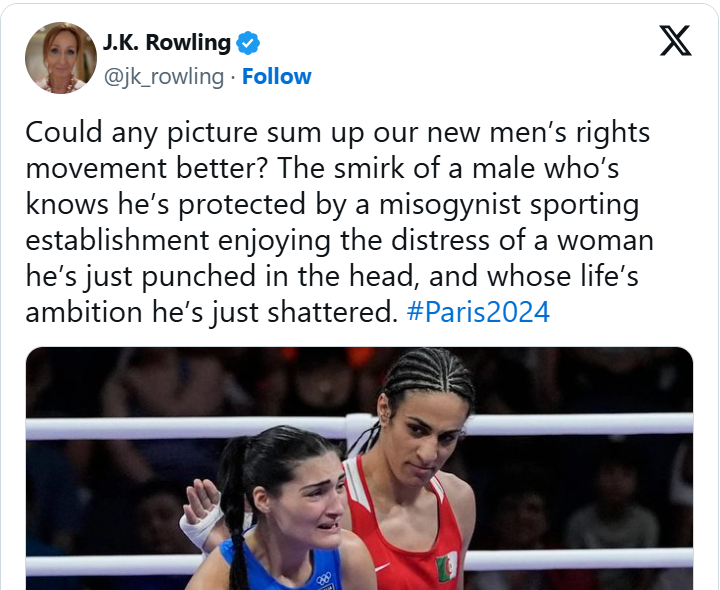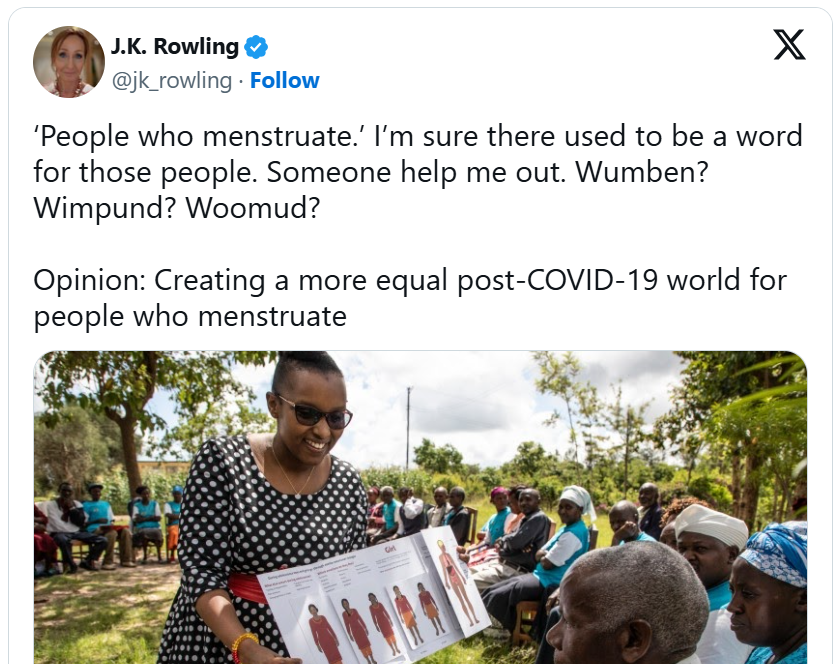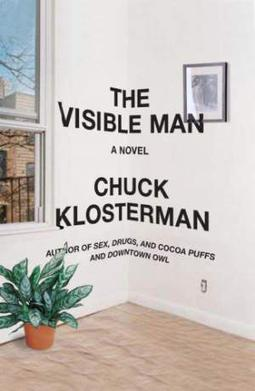Despite being a well-loved children’s author, J.K. Rowling took to the internet to write wrong and arguably repulsive comments. Following the Paris Olympics, she wrongly gendered a female boxer on Twitter (X).

The Olympian being addressed is Imane Khelif, a cis-gender professional boxer from Algeria who competed in the 2024 Olympics. In the post, J.K. Rowling assumes, likely based on Imane’s appearance and skill, that she must be a trans woman. She then berates the boxer for shattering her competitor’s “life’s ambition,” despite the competitor herself having acknowledged Imane’s skills in an interview. Through this post, it appears that J.K. Rowling demonstrates far more misogyny for not believing Imane to be a cis woman because of her strength than the supposed “misogynistic sporting establishment.” Likewise, in a post during the pandemic, she ridiculed the term “people who menstruate.”

Here, she clearly mocks the post for not addressing those who menstruate as women. However, similarly to the post regarding the boxer, her “correction” is incorrect. Even if an individual, for whatever reason, believes that a person’s gender must align with their sex assigned at birth, J.K. Rowling’s opinion would remain wrong, as it is possible for some intersex people to menstruate as well. Overall, her adamant refusal of inclusive language makes little sense. Inclusivity within a society is crucial for maintaining equity (something I’d argue should be upheld…); opposing such efforts only further excludes and stigmatizes different groups of people, leading towards systemic harm (which like, PLEASE–this world has had enough of it). Therefore, when writing children’s books, it’s highly important to integrate accurate/correct representation of different genders, ethnicities, races, etc.. (For anyone confused: I’m not saying children’s books should or must require arguably complex topics for children such as critical race theory, gender studies, etc.. However, diversity and representation should be there, even if not directly impacting a critical plot point, etc.).
J.K. Rowling is awfully careless about representation in her books. (As a side note, she also wrote multiple books under the pseudonym, Robert Gailbraith, where she paints trans people as villains. So, uh–make of that what you will; it’s a whole other drama that, although relating to some earlier points, doesn’t necessarily progress the current argument. I’d argue that it’s still important to be aware of, though!). For example, in the Harry Potter series, the character Cho Chang is meant to be of Asian heritage. However, many criticize this name; “Cho” is not a real name and is arguably cartoonish. It also plays into racist stereotypes of how languages from Eastern Asia sound. Likewise, there’s also the twins Padma and Parvati Patil, whose names/characters overall face similar critiques. (For a more in-depth explanation about why these three characters are problematic, I found these articles which I believe do a decent job of further explaining the controversy: I Think the Harry Potter Movies Treated 2 Characters Awfully (But They Had a Ton of Potential) and Why Cho Chang Is a Controversial Name in Harry Potter).
Therefore, J.K. Rowling seems to not put much thought into her characters (also, let’s not forget she’s also literally just a shit person!!! (imo…)). However, her writing flaws don’t end there. The Harry Potter series faces numerous plot holes and underdeveloped worldbuilding. Here’s an article that offers forty moments where something in the Harry Potter series made (arguably) no sense: The 40 Biggest Plot Holes In The Harry Potter Franchise. And here is a summary of the examples I found most relevant:
In Harry Potter and the Order of the Phoenix, Voldemort insists that Harry is the one to take the prophecy off the shelf (it could only be removed by Voldemort or Harry) despite his death eaters having entirely conquered the room where the prophecy was. One might argue that Voldemort wanted to stay safe, but that argument would be rendered void since minutes after Harry grabs the prophecy, Voldy shows up anyway to fight Dumbledore. (Then again, maybe the whole point was to bring Dumbledore to a controlled location, but I doubt JKR thought that far considering that, in an interview, she said that she never saw any parallels between her death eaters and nazis when asked… (again, just imo)).
The date and day of the week never align with the year. For example, despite September first being a different day of the week each year, Hogwarts students continuously begin school on a Monday (supposedly September 1st). Despite these details being relatively small, they still show the inconsistencies and lack of attention to detail in the books.
ANYHOO. NOW THAT I’VE ESTABLISHED WHY J.K. ROWLING AND HER HARRY POTTER BOOKS LOWKEY SUCK, HERE'S WHY THE FANFICTION VERSION OF HARRY POTTER IS FAR BETTER:
(the following portion of this blog post will remain relatively vague to avoid spoilers)
“All the Young Dudes,” written by Mskingbean89–(real identity has never been leaked)--(also, the title is a song reference–iykyk-hehe david bowie)--was uploaded onto Archive of Our Own (popular fanfiction (fic) website also known as Ao3) in 2017 and completed in 2018. Since then, this fic has been translated forty-nine times, has been clicked on 17,371,193 times, and received 263,289 kudos (equivalent of likes). It consists of 188 chapters and 526,969 words. The story follows Remus Lupin’s perspective as he maneuvers through his Hogwarts years as a teenager, therefore spanning from 1971-1995.
Throughout the fic, Mskingbean89 makes clearly well-researched and detailed references to actual slang, terminology, historical moments from the 1970s alongside believable and realistic characters. Although subjective, I find her writing style to be far better than J.K. Rowlings’s–it's somehow both eloquent and easy to read and nicely flows together, reading easily even when depicting the mind of an eleven-year-old boy; it's so effortlessly evident that one is reading a child’s thoughts, but the words still draw you into the story. I cannot recall a singular moment while reading where I found myself pausing because of strange descriptions or similar awkward phrasing.
Furthermore, Mskingbean89 manages to arguably accurately (yet respectfully) incorporate themes regarding LGBTQ+ experiences (Remus literally dates Sirius, but there's also decent representation and recognition of LGBTQ+ movements during the 1980s and 1990s) and also acknowledges poverty among other real-world stuff, whereas J.K. Rowling can’t even properly write a non-European character, let alone historical realities and economic disparities.
“All the Young Dudes” also shows incredible character development. Each individual character feels real and is clearly affected and changed by other characters, situations, environments, etc.. I don’t think the same can always be said for Harry Potter (lowkey, I would give some examples here, but I think this blog post has gone on long enough.)
BUT ANYWAY. I HOPE THIS POST MADE SENSE. BASICALLY, MORAL OF THE STORY: JKR SUCKS, HER BOOKS SUCK LESS, THE FANFICTION DOESN'T SUCK.
If you want to check out the fanfiction for yourself here is the link: All the Young Dudes - Chapter 1 - MsKingBean89 - Harry Potter - J. K. Rowling [Archive of Our Own]
WELL- THANKS FOR READING MY LAST BLOG POST! BYE BYE!
-Karina
